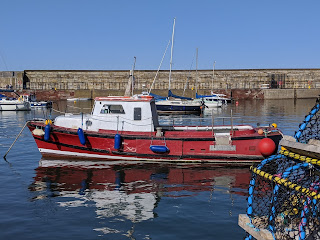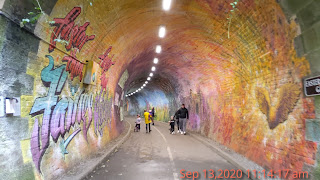TEN THINGS I'LL MISS ABOUT LOCKDOWN
The covid-19 pandemic has turned 2020 into a very strange year for most of us. A tough time for many with the deaths, illness, loneliness, mental health issues, money shortages, redundancies, postponed operations and cancelled events. The list of ways in which people have been affected goes on and on. And it's far from over yet, today's news from Aberdeen showing how easy it is for progress in suppressing the virus to be reversed if we don't all adhere to the ScotGov guidelines.
But for most of us lockdown is not what it was in April and May and into June. Streets and shops are far busier, we can meet people, travel, go out to eat and drink, there is a greater sense, a fragile sense, of something nearer to 'normal'. The number of cases, and deaths, in this country (although not so much south of the border) has been declining steadily and the risks don't feel as great. But let's not be overly optimistic at the moment, with colder weather to come and the risk of a second wave meaning that lockdown may not be entirely in our past. We all hope not.
But,
apart from (possibly) having the virus, and maybe
some resulting longer term issues we're among the fortunate ones. A comfy home, a steady income, living with someone you love, and the cat, are (with reliable broadband!) the ingredients for contentment. For much of the time I can honestly say I enjoyed lockdown, and there aspects of it I already miss, or know I will in future. So here's my list of the things I found brightened up the lockdown weeks.
1. The daily updates from the Black Isle Correspondent
Folk musician and broadcaster Anna Massie found herself locked down back home with her parents in Fortrose and decided to make a wee daily video about lockdown life. It quickly became an essential element of the Crawfords' routine. Who knew bin-washing and scone-making could be so entertaining? She's still putting out the odd one every few days, but the what'll-she-do'next thrill isn't what it was.
You can still see the full hundred plus wee videos on her YouTube channel.
2. Clean air
Wasn't it blissful? Peace, quiet, and a huge reduction in air pollution. You could go into the city centre and hear the birds singing. Wildlife started popping up in unexpected places. Humans were being stressed out, but the planet got a rest. Is anyone in power learning the lessons?
3. Constant praise from government and media...
Well, it felt like praise. This was THE time in history for us anti-social introverts, when keeping your distance from others, and staying shut away at home as much as possible, became the right thing to do.
4. Edinburgh Rugby classic matches
As a fairly recent convert to supporting the club their decision to broadcast classic games from the past, every Saturday at 3, was the perfect means to learning a bit more about them, and having some regular sport to look forward to. A ritual developed, as I vanished off with a tray of snacks to shout at a screen for a couple of hours. They finished a few weeks ago, and I still miss them.
5. The Stand's Saturday night shows
I've watched plenty of musicians doing live web shows in recent months. Playing to no live audience must be a strange experience, and some adapted to it better than others, but once they are playing that's them into their comfort zone, doing what they do best, irrespective of the dearth of people in the room. But it's an even tougher experience for stand up comedians, who rely so much on laughter to keep them going. So it's been fascinating to watch the evolution of the show that the Stand Comedy Club has broadcast every Saturday evening since lockdown began (and which will continue for the foreseeable future, as there's little prospect of them being able to open for weeks, maybe months, to come). Both in terms of the format of the show, and ability of individual comics to adapt their act to the new circumstances. As with the musicians some have managed better than others, but everyone who's had the chance to have a few goes has improved every time. While the comedy value can be hit and miss it's still a must-watch, with some brilliantly memorable moments along the way. (And some bafflement during the 2 weeks when it came from the Newcastle club - were we the only ones needing subtitles?)
Also, in conjunction with #4, Saturday's became the only day of the week with the slightest bit of structure.
6. Strangers keeping their distance
See #3 above!
Apart from the eejits walking along looking at their phones. And some joggers. And cyclists on the pavement (why, when the roads were almost deserted??).
But otherwise...
7. Not having to be anywhere on time
Yes, I have missed all the plays and gigs and shows and the whole major festival season that takes on Edinburgh from April to August. Yes, I, sort-of, missed my voluntary work (although I've found the past few months has made me question much of what I want from life now). And yes, I am retired so any target times I had to meet were purely of my own choosing. But still... it's been so nice not to worry about being out on time, about missing buses or being in the queue early enough to get a good seat.
Come to think of it, it was quite nice not having to be anywhere.
And never setting an alarm 😉
8. More money than month
I've paid out to watch online gigs, like the Stand, tried to buy from some local businesses, done a bit of internet shopping. But. No stopping for cakes in cafes. No tickets for ScienceFest, TradFest, FilmFest, JazzFest, Fringe, plays, films, random gigs. Now I know where all my cash used to go to.
9. Video chats
I've seen more of our old friends down south during the lockdown months than in the past five years after we moved north. Hopefully this'll be one benefit of the pandemic that will stay with us.
10. Lockdown hair
Who cared? Wasn't it nice not to give a toss what you looked like (OK, some might be surprised that I did before...). Wear what you wanted, look whatever. And another contributor to #8.
Err...11. Being together
I know I said ten, but I couldn't leave this one out, and I hope you're lucky enough to have had the same experience.
While we always did do a lot together, especially in August, we also had our separate lives, different voluntary activities, different evenings out. But for lockdown, other than me going out for shopping some days, we were always around one another. No doubt it helps that the flat is a decent size, so we could easily be doing different things, but it was still a huge increase in the amount of time spent in one another's company. And that was just fine. After 27 years it's nice to have a reminder of how much we actually like each other.
(Well, how much I like her - she might say otherwise...)
















































